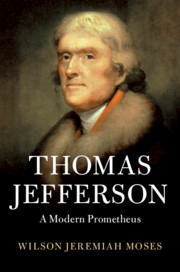Book contents
- Thomas Jefferson
- Cambridge Studies on the American South
- Frontispiece
- Thomas Jefferson
- Copyright page
- Dedication
- Contents
- Preface
- Acknowledgments
- Note on Methods and Bibliography
- 1 Introduction
- 2 Lincoln and Historiography
- 3 Let Our Workshops Remain at Monticello
- 4 Life, Liberty, Property, and Peace
- 5 What is Genius? “Openness, Brilliance, and Leadership”
- 6 A Renaissance Man in the Age of the Enlightenment
- 7 Baconism and Natural Science
- 8 Anthropology and Ethnic Cleansing: White “Rubbish,” Blacks, and Indians
- 9 Education, Religion, and Social Control
- 10 Women and the Count of Monticello
- 11 Debt, Deference, and Consumption
- 12 Defining the Presidency
- Index
11 - Debt, Deference, and Consumption
Published online by Cambridge University Press: 01 April 2019
- Thomas Jefferson
- Cambridge Studies on the American South
- Frontispiece
- Thomas Jefferson
- Copyright page
- Dedication
- Contents
- Preface
- Acknowledgments
- Note on Methods and Bibliography
- 1 Introduction
- 2 Lincoln and Historiography
- 3 Let Our Workshops Remain at Monticello
- 4 Life, Liberty, Property, and Peace
- 5 What is Genius? “Openness, Brilliance, and Leadership”
- 6 A Renaissance Man in the Age of the Enlightenment
- 7 Baconism and Natural Science
- 8 Anthropology and Ethnic Cleansing: White “Rubbish,” Blacks, and Indians
- 9 Education, Religion, and Social Control
- 10 Women and the Count of Monticello
- 11 Debt, Deference, and Consumption
- 12 Defining the Presidency
- Index
Summary
In Federalist 10, Madison recognized various interests dividing the propertied classes: “A landed interest, a manufacturing interest, a mercantile interest, a moneyed interest, with many lesser interests,” but not the slaveholding interest that had divided the Constitutional Convention in 1787 and forced compromises that included a limit on the duration of the slave trade, an innocuously worded fugitive slave law, and a three-fifths compromise on slave representation. The “landed interest,” with which he and Jefferson and his Democratic Republican Party passionately identified, was split between those who opposed the Atlantic slave trade and those who wished to see it thrive. The Federalist Party also included a landed interest, embodied in John Adams, who during his presidency escaped for extended periods to his Braintree Massachusetts farm and, according to Edmund S. Morgan, “allowed his enemies to gain control of national affairs, while he managed the corn and potatoes.”
- Type
- Chapter
- Information
- Thomas JeffersonA Modern Prometheus, pp. 389 - 426Publisher: Cambridge University PressPrint publication year: 2019

